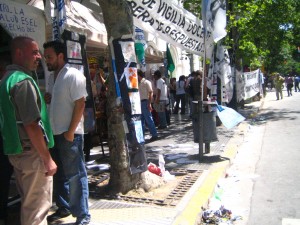Teachers: taking action at the root
In March this year, there was a huge strike from the teachers’ union in which they demanded a salary raise. Every year, the timing works out almost identically: the academic year in Argentina starts in March, and some three weeks to a month before that, negotiations with the union take place. There was the threat that classes would not actually start because no agreement had been reached. Teachers in Argentina have some of the lowest wages in society, so it’s very common that they have to overwork themselves to make a decent living.
Teachers’ demands for better wages was in the public agenda this year when congressional representatives voted themselves a raise of 100 percent. The deputies and senators involved already had a very good salary before this increase. However, the teachers’ claim was turned down. On top of that, on Opening Sessions Day in the Senate, President Kirchner disregarded the educators’ claim, saying they only work four hours a day and have three months holiday. A national teachers’ strike followed the next day, and it lasted for two full weeks.
Why would our president make such a dismissive statement and openly break bonds with such a key sector? I didn’t get it… There must be another explanation, a hidden purpose, I thought to myself.
So when I was visiting my friend Maria Eva in the province of La Pampa, I asked her mother about all of this. I value her opinion a lot: She supports the current administration and is a teacher herself. I asked her about this big fall out between the union and the president. She didn’t see much significance in the things Kirchner said: “What she said… well, is a very commonplace idea, as old as the sky.” Ultimately, I interpreted the president’s remarks as a way of trying to side with the ordinary citizen, who has just a basic education and a lot of economic worries.
Our current administration is clearly a populist one. However, I think this kind of public discourse usually just gets in the way of what really needs to be done, and Argentina is facing an emergency situation. The teachers’ union has been an ally of the ruling political party ever since it took control of the government in 2003. We are now going through our ninth year with this government, and the economic situation for teachers has not changed much. Money is not only about personal enrichment: it is recognition to you as a professional. A good wage means you can let go of some material problems give thought to other concerns that might help you develop your vocation further.
A very concrete example is the program “Conectar Igualdad” (Link up Equality). Through this action, the government has distributed more than three million netbooks to kids and teens of primary and secondary schools in Argentina. It happens often that the kids have a new computer, but there is no Internet in the school, or the teacher does not know how to work with it inside the classroom. An alarming proportion of educators don’t even know how to use a computer. When I ask about the learning spaces that complete this initiative, the training for teachers, I am told this takes place on Saturdays. Why would any already under paid professional volunteer for work on a free day?
The government’s actions seem only to touch the surface of problems. When you remove that layer, the actions do not really go as deep as they should.





